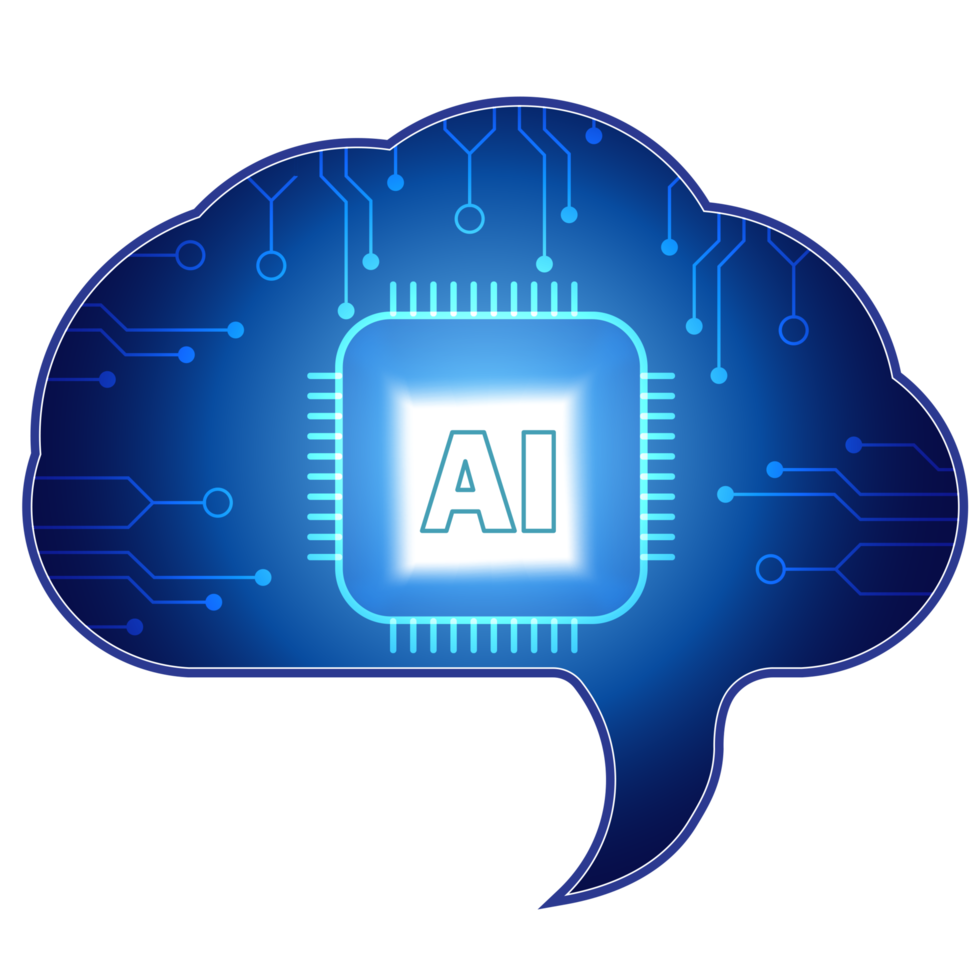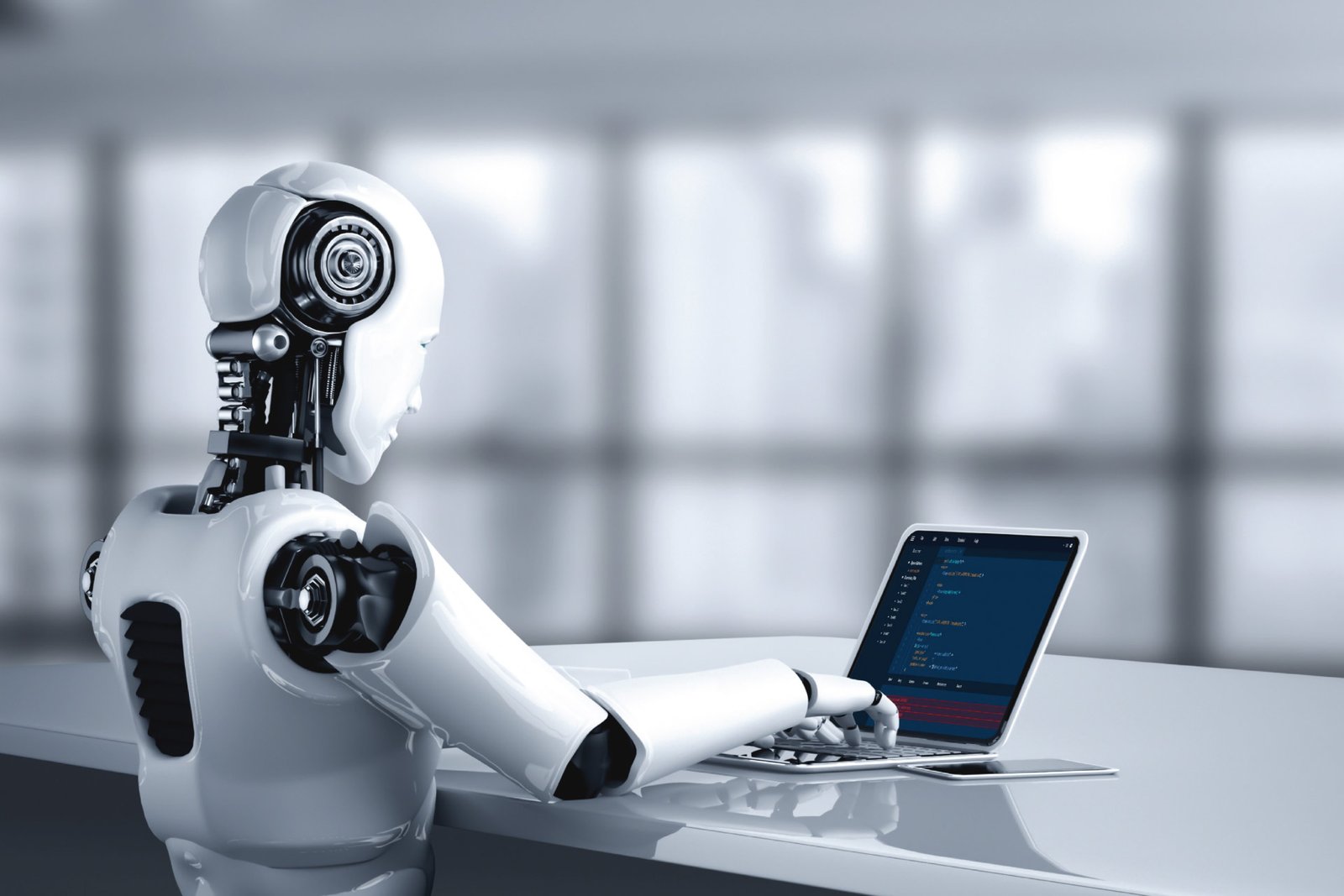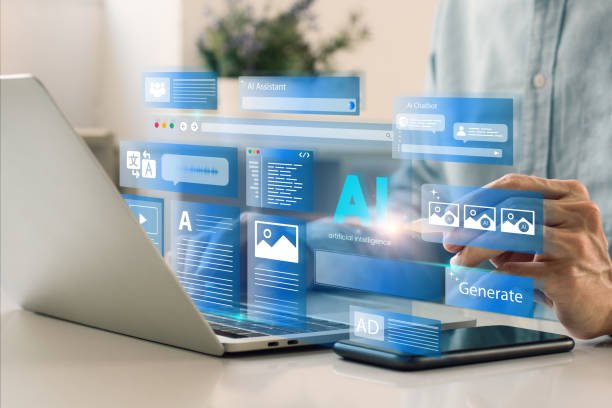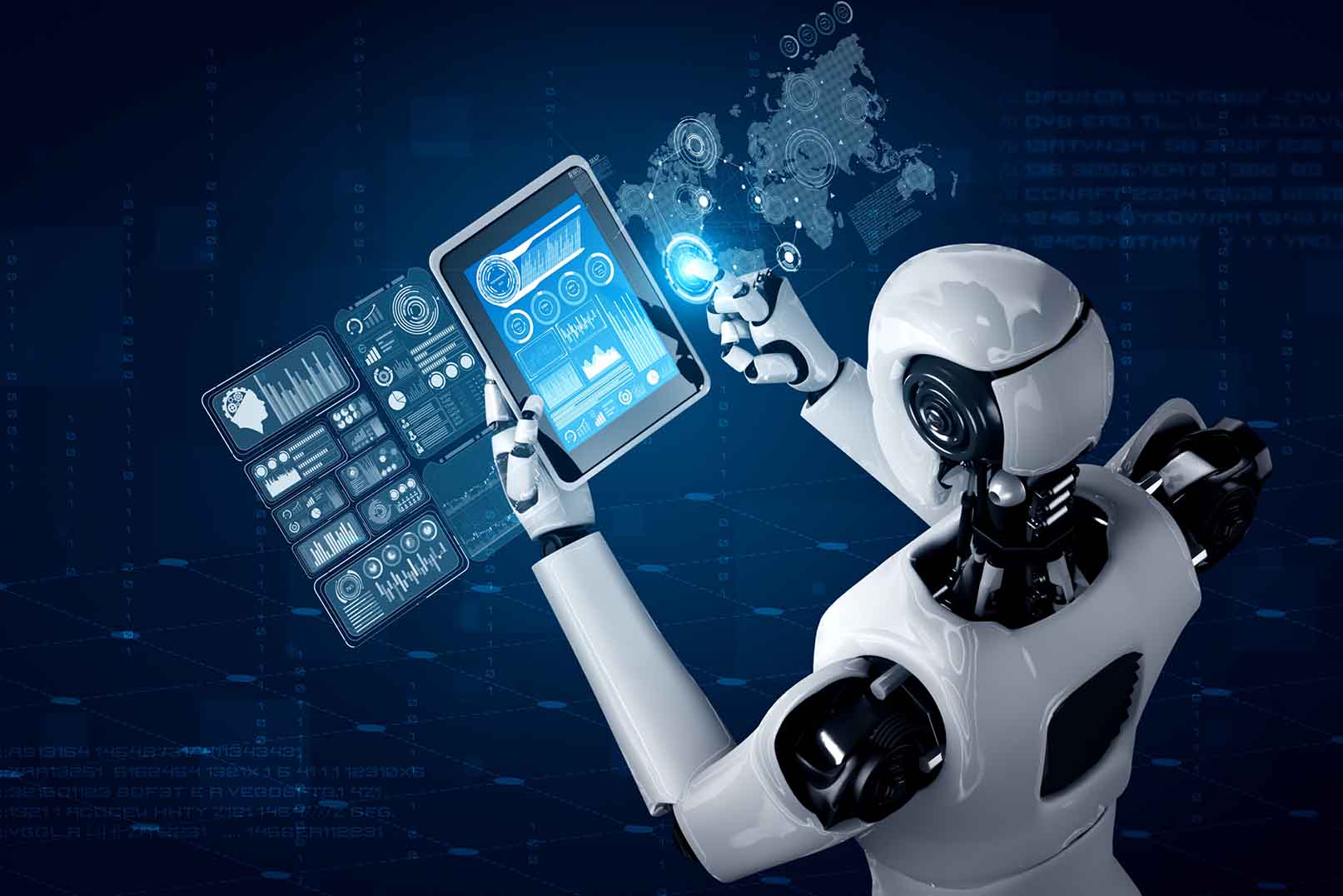by Admin
Web Development
Comments (05)
AI Transforming the Web
AI in web design has changed the method by which websites are designed as well as the way they're maintained. Since companies are increasingly dependent on intelligent and automated platforms, it's crucial to understand the ways in the way that AI improves the design of websites.
This blog will examine the possibilities of web development in the wake of the advent of AI and tackles a fundamental question: Does web development have a place in the time of AI?
1. Smarter Development with AI-Powered Tools
AI in web development is revolutionizing the way developers write code. Modern tools such as GitHub Copilot or Amazon CodeWhisperer employ machine learning to recommend relevant code snippets, spot issues early, and automatically complete repetitive tasks in coding. This smart automation greatly improves the productivity of developers and also improves the quality of code.
Furthermore, these tools are able to learn from millions of codes and constantly improve their suggestions. Even beginners get expert-level guidance, which reduces the amount of time required for projects and also helps to reduce the risk of errors. There is a possibility of more precise and contextually sensitive assistance with development as AI develops.

As developers become more comfortable with integrating these tools into their daily workflows, we can expect even more advanced capabilities—such as real-time collaborative coding environments driven by AI, improved debugging tools that can correct logic errors autonomously, and integrated AI that can work across both frontend and backend technologies seamlessly.
The new technologies will not just increase development speed but help to create more secure, clean, and reliable codebases that scale and are simpler to manage over the long term.
2. AI and Personalized User Experiences
Web development isn't solely about technical features. AI allows websites to create customized layout contents, content, as well as product suggestions, based upon the person's preferences and behavior. Netflix, Amazon, and Spotify are three of the examples of companies using customized marketing techniques based on AI in order to boost the level of customer engagement and satisfaction.
AI algorithms study user data and present relevant content improving conversion rates as well as general satisfaction. Designers must think about the possibility to incorporate machine-learning algorithms and engineered suggestions on their website. AI can be used in the design of websites to make sure that each user is supplied with information that is pertinent to their interests, improving the efficiency of websites and making them more innovating.
"The integration of AI in web development represents the most significant shift in digital experiences since the advent of mobile. We're moving from static pages to dynamic, intelligent interfaces that adapt to each user in real-time."
In addition to simple suggestions, AI systems can now detect subtle patterns in behavior and adapt the user's experience in line with. A typical eCommerce platform could use AI to tailor the website layout to a customer who frequently shops for sports products versus someone who would prefer electronic products.
In addition, dynamic pricing models that are enabled by AI could help keep businesses at a competitive level while also offering customized offers for customers who are unique. As AI technology develops it will allow the user experience to get even smoother, driven by real-time information as well as contextual decisions, resulting in the level of personalized service which was previously impossible.
3. Enhanced Web Testing and Maintenance
Testing is critical to web development, and AI has taken it to the next level. Traditional manual testing methods are time-consuming and prone to human error. AI-powered testing tools like Testim and Applitools automate testing by simulating thousands of user interactions and identifying issues that human testers may miss.
Predictive maintenance is another innovation. Based on previous performance data, AI can forecast when the site will have difficulties. It allows companies to address issues before they occur which reduces downtime as well as creating a better user experience. The tools help reduce time as well as consuming less resources and produce better-performing and safer websites.
-
Automated Cross-Browser Testing
-
Performance Optimization
-
Security Vulnerability Detection
Development teams are embracing AI-driven test solutions are getting more commonplace. Along with efficiency and speed AI-powered QA has the ability to adjust to changing user behaviour and can test on multiple platforms, devices, and operating systems, all without manual setting up.
This lets developers release new features faster and with greater assurance that their products have been evaluated under real-world circumstances. Furthermore using AI recording logs of any issues as well as fixes and performances, it's more easy to identify patterns and address any problems that are recurring that can lead to better overall web health and satisfaction.
4. Content Generation and SEO Optimization
Content is the most important thing, and AI helps create top-quality optimized, SEO-friendly content quicker than before. ChatGPT as well as Jasper AI can generate blog content as well as FAQs, descriptions of products, as well as landing pages, with only human intervention.
AI can also play an important role in SEO strategies. AI can analyze search trends as well as identify keywords that are relevant as well as optimize the meta tags, headings and the internal linking structures. It will ensure that your website ranks higher in search results, and attracts more organic traffic. With AI, web development teams can collaborate better with marketing professionals in order to design more intelligent, data-driven websites that rank well and convert effectively.
Moreover, AI can continuously monitor SEO performance and adjust strategies in real time. For instance, if a newly implemented keyword begins to trend down, AI tools can alert the content team to pivot the strategy immediately—Something that conventional analytics techniques may take days or even weeks to discover.
In addition, AI is increasingly used for voice search optimization as well as generated data in structured format, both of which are vital to contemporary SEO. Since search engines are becoming more advanced, only those sites that use artificial intelligence-driven SEO strategies that can keep their advantage.
5. The Future of Web Development After AI
The future of web development after AI is both exciting and transformative. While AI could automate specific tasks, it won't remove the need for developers. Instead, it can shift their responsibilities to more creative and strategic tasks. Back-end and front-end developers will focus on creating more user-friendly experiences, building solid architectures, and ensuring AI systems are implemented ethically and efficiently.
Human oversight is crucial for keeping AI in check and preventing biases. Furthermore, AI will lead to the creation of new roles in development, like AI integration experts, data engineers, and UX strategists. Developers who can adapt and become more adept at working alongside AI will become more valuable than ever before.
As we look ahead, it's clear that web developers will become more like curators of digital experiences than mere coders.Their job will require understanding the human behaviour and ethical data practices and collaboration across functional lines. To be web developers who are successful is not just going to require technological skills, but also an comprehension of psychology, accessibility, strategy for business, as well as AI administration of systems.
6. Does Web Development Have a Future?
Absolutely. Although there are concerns that AI could replace traditional programming, the reality is more complex. AI is an effective tool, but it cannot substitute for human creativity, intuition, or problem-solving capabilities.
Web development has a bright future. As the pace of digital transformation increases, the demand for skilled developers will continue to grow. Businesses need professionals who can harness AI — not be replaced by it. AI in web development will streamline workflows, reduce costs, and enhance digital experiences. Humans will continue to have a significant role to play in the way technology works for its users.
In the future, developers will be become more than just the people who carry out tasks, but rather the stewards of innovation. They will be leading the way in integrating ethical AI as well as ensuring the transparency of digital apps, and making sure that they are accessibility across the entire spectrum of devices and populations. The bottom line is that AI isn't a barrier to opportunities on the web, but it increases opportunities.
7. AI in Web Development: Case Studies & Real-World Use
Let's look at how real companies are using AI in web development:
- Wix ADI (Artificial Design Intelligence): Allows users to create websites in minutes using AI-driven templates and layout suggestions.
- Shopify: Uses AI to personalize shopping experiences and provide real-time customer support via AI chatbots.
- Adobe Sensei: Provides smart image editing as well as Content suggestions for web developers and designers.
These examples show how AI is already implemented in some of the most widely used web development tools and platforms. Their success stories underline how integrating AI isn't just a luxury; it's becoming a necessity for scalability and competitiveness.
8. AI's Role in Accessibility and Inclusion
Another place that AI can have a huge contribution is the accessibility. AI-powered software can generate alt-text for images, spot accessibility issues instantly as well as provide audio-guided navigation options. This makes sites more accessible to people disabled, and complies with international accessibility standards such as WCAG.
Accessibility for Web users isn't an option It's legally and ethically necessary. AI assists developers in identifying problems and resolving them swiftly making sure that the digital experience is available to all. Future developments will see AI is expected to play an increasing part in the introduction of options such as real-time translation of languages, automatic captioning, and an individual navigation system that can be customized to people who have specific physical or mental disabilities.
9. AI in E-commerce and Customer Interaction
The world of e-commerce is changing, and AI has revolutionized how companies communicate with their customers. Chatbots that are powered by AI offer 24/7 assistance to customers, and recommendation engines help increase sales by displaying products to customers that they're likely to purchase. They improve the experience of the customers as well as bring in income.
AI also enables real-time inventory tracking, dynamic pricing, and fraud detection — all integrated into modern web applications. This shows how AI is not just a backend tool but a front-facing enabler of better business operations. The competition for online retailers increases, companies that implement AI to improve customer interaction can build better relationships with customers and longer lifecycles for customers, establishing them as market leaders.
10. AI and Web Security
Cybersecurity is one of the top concerns in today's digital world, and AI is stepping up to address it. AI-powered security systems can detect anomalies in user behavior, identify potential threats in real-time, and respond faster than human teams.
With cyber-attacks becoming more sophisticated, AI can help web developers integrate proactive security measures, such as:
- Identifying SQL injections and DDoS attacks
- Monitoring for data breaches
- Ensuring compliance with GDPR and other regulations
In a time when competition in the online retail industry increases, companies that implement AI to improve customer interaction can build better relationships with customers and longer lifecycles for customers, establishing their businesses as leaders in the industry.
11. AI and Low-Code/No-Code Development
The rise of low-code and no-code platforms is reshaping how websites and applications are created. AI enhances these platforms by:
- Automatically generating code based on user input
- Recommending UI/UX improvements
- Enabling drag-and-drop interfaces with intelligent backend logic
This shift in web development has democratized the process that allows business users as well as marketers to create robust web applications with no technical understanding. But skilled programmers are vital for customizing, scaling and integration with other systems. The most significant benefit in low-code systems is in helping groups across different functional boundaries collaborate more efficiently and faster in bringing electronic goods to the market at a rapid rate.
12. Preparing for an AI-Enhanced Development Future
To thrive in the AI-driven future of web development, professionals should:
- Learn to use AI tools like GitHub Copilot, ChatGPT, and TensorFlow
- Stay updated on AI ethics and data privacy laws
- Develop soft skills such as creativity, communication, and problem-solving
Collaboration will become more important than ever.Developers will have to collaborate together with data scientists AI experts, engineers as well as UX experts to develop authentic web experiences.Developers will need to work with data scientists AI experts engineers and UX experts to create genuine web experiences.The future is dependent on those who learn, and who can bridge the gap between design that is human-centric and modern technology.
Conclusion
Artificial Intelligence (AI) in web development is a thrilling development. From assistance with programming and personalization of user experience as well as automated tests and creation of content, AI is making websites more effective, faster and efficient.
The next stage in the development of web-based apps after AI isn't about re-invention It's about advancing. Developers who are willing to embrace AI will be more productive and highly sought-after. Does web development have an future? Yes — and it's more innovative, creative, and essential than ever before.











